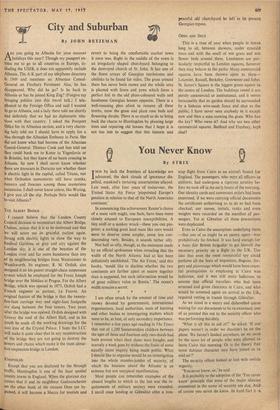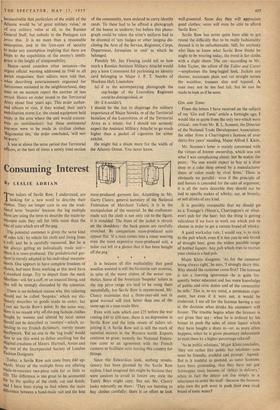You Never Know
By STRIX
T NCH by inch the frontiers of knowledge are 'advanced, the dark clouds of ignorance dis- pelled, mankind's torturing uncertainties allayed. Last week, after four years of endeavour, the United States Air Force 'pinpointed Europe's position in relation to that of the North American continent.'
In announcing this achievement Reuter's choice of a main verb might, one feels, have been more closely attuned to European susceptibilities. A tiny atoll or a sunken wreck—these you can pin- point; a socking great land mass like ours would seem to deserve some ampler, some less con- descending verb. Besides, it sounds rather silly.
Not half so silly, though, as the statement made by an official spokesman when revealing that the width of the North Atlantic had at last been definitively established. 'The Air Force,' said this booby, 'would like to disclose whether the two continents are farther apart or nearer together than is supposed, but such information would be of great military value to Russia.' The ocean's width remains a secret.
I am often struck by the amount of time and money devoted by governments, international organisations, local authorities, seats of learning and other bodies to investigating matters which seem to be, at best, of only secondary importance. I remember a few years ago reading in The Times that out of 1,200 Somersetshire children between the ages of three and fourteen only two-thirds had been present when their shoes were bought; and scarcely a week goes by without the fruits of some equally inane inquiry being made public. What I should like to organise would be an investigation into the whole mumbo-jumbo of security, of which the business about the Atlantic is an extreme but not untypical manifestation.
Most people can remember examples of the absurd lengths to which in the last war the re- quirements of military secrecy were extended. I recall once landing at Gibraltar after a non- stop flight from Cairo in an air,craft bound for England. The passengers, who were all officers in uniform, had undergone a rigorous scrutiny be- fore we took off in the early hours of the morning. Our identity cards and movement orders had been examined; if we were carrying official documents the certificates authorising us to do so had been checked; our names, initials, ranks and even weights were recorded on the manifest of pas- sengers. Yet at Gibraltar all these precautions were duplicated.
Even in Cairo the assumption underlying them —that one of us might be an enemy agent—was prohibitively far-fetched. It was hard enough for a bona fide British brigadier to get himself, the necessary, priority on a flight to the UK. The idea that even the most resourceful spy cOuld perform all the feats of imposture, disguise, for- gery and piston nage which would have been essen- tial prerequisites to emplaning at Cairo was ludicrous; and it was still more ludicrous to assume that official travellers who had been screened and given clearance in Cairo, and who would be screened again on arrival in the UK, required vetting in transit through Gibraltar.
As we stood in a weary and dishevelled queue waiting for our documents to be re-examined, one of us pointed this out to the security officer who was performing this duty.
'What is all this in aid of?' he asked. 'If our papers weren't in order we shouldn't be on the plane. We haven't landed anywhere, so we must be the same lot of people who were allowed to leave Cairo this morning. Or is the theory that some dubious character may have joined us in mid-air?'
The security officer looked at him with owlish sagacity.
'You never know, sir,' he said.
It is probably to the adoption of the 'You never know' principle that most of the major idiocies committed in the name of security are due. And of course you never do know. In hard fact it Is inconceivable that particulars of the width of the Atlantic would be 'of great military value,' or of any military value at all, to the Russian General Staff; but nobody in the Pentagon can Prove this. It is no more than a reasonable assumption, and in the lynx-eyes of security to make any assumption implying that there are limits to the capabilities of the enemy's intelli- gence is the height of irresponsibility.
Hence—amid countless other instances—the Urgent official warning addressed in 1940 to all Parish magazines; their editors were told that, When describing entertainments organised for Servicemen stationed in the neighbourhood, they must on no account report the number of teas served. Hence an order issued to the Territorial Army about four years ago. This order author- ised officers to visit, if they wished, their unit's mobilisation stores (i.e. the crated equipment held ready in the area where the unit would concen- trate on mobilisation); but these sentimental lout neys were to be made in civilian clothes. 'Regimental ties,' the order concluded,- 'will NOT be worn.'
It was at about the same period that Territorial officers, at the best of times a sorely tried section



































 Previous page
Previous page